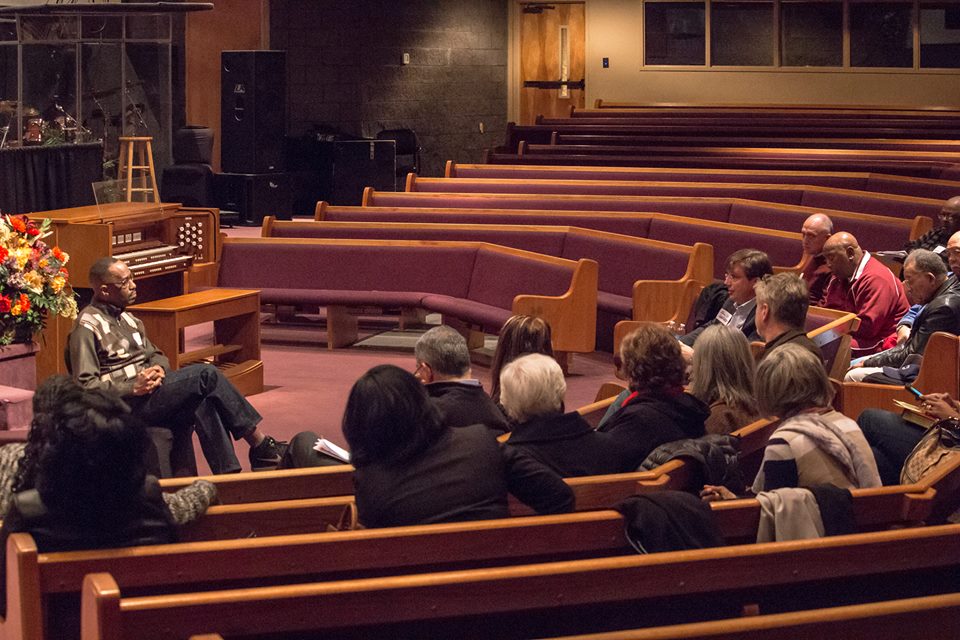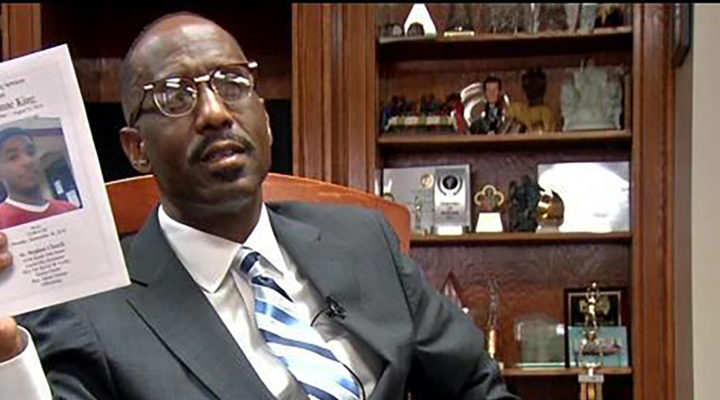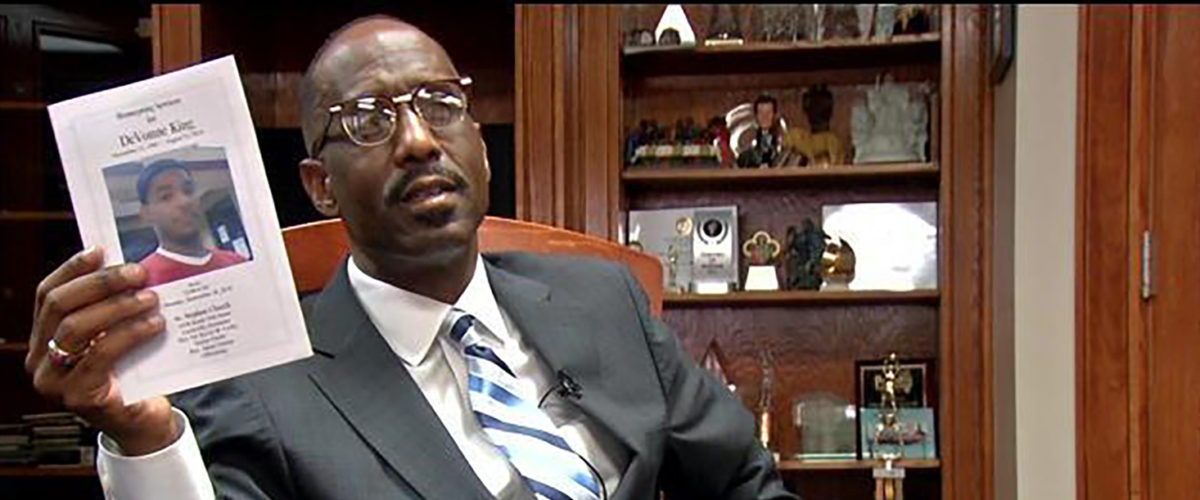An African-American pastor who recently became involved with the Cooperative Baptist Fellowship told a dinner gathering for friends of Baptist News Global June 23 his hope is the movement would become less concerned about “just having blacks in white space” for the sake of diversity and more involved in building institutions that empower the masses of African-Americans in predominantly black neighborhoods.
Kevin Cosby, pastor of St. Stephen Church in Louisville, Ky., said despite the best intentions of white people of good will, the reality is that racism is permanent and there is always going to be a black community.
“It’s a sad reality, but it is a reality,” Cosby said. “Concentrated poverty is here. The only question is are we going to have institutions in this space that serve these people.”
“If CBF can ever partner with institutions in the ‘hood to create a strong presence in black space, it will be transformational,” he said.

Two Louisville pastors, Kevin Cosby and Chris Caldwell, dialogue during the annual Friends of Baptist News Global Dinner during the recent CBF General Assembly in Greensboro, N.C.
Cosby, pastor of the predominantly African-American church started by his grandfather for 37 years, described his philosophy for Empower West Louisville, a collaborative effort to invest in black lives he expanded in the last year to include white partners including leaders of the Kentucky Baptist Fellowship.
“Part of the problem with the urban community is integration,” Cosby said. “That is one word that I detest. I detest the word integration, because integration has meant the disintegration of black institutions that service the masses.”
“The word for me is reconciliation,” he said. “Integration is a social construct that is built on the premise that there is something defective about blackness and that blackness is something that black people have to overcome. The black classes get absorbed into white-controlled institutions thus leaving the masses of African-Americans leaderless.”
Cosby said it’s no different than the narrative in the Old Testament book of Nehemiah.
“The Jerusamelites lost their leaders,” he said. “Nehemiah was then absorbed into the Persian Empire and had to make a decision whether or not he was going to be a Jew or a Persian.”
“So Nehemiah said, ‘I am going back to the ‘hood and engage in empowerment,’” Cosby said. “That’s what I have been doing at St. Stephen Church for the 37 years I have been there.”
Cosby said prior to integration, there were five black institutions that formed the backbone of the African-American community – strong black churches, families, media, schools and businesses. All five, he said, have been dismantled due to integration.
“What happens is the black professional class gets co-opted by white controlled institutions, and whites have the delusion of inclusion.”
He said most blacks who are in white institutions are part of the black professional class. “What happens is the black professional class gets co-opted by white controlled institutions, and whites have the delusion of inclusion,” Cosby said. The masses of African-Americans, meanwhile, are left without institutions to serve their needs.
Chris Caldwell, pastor of Broadway Baptist Church in Louisville, said early on in meetings he and the other the white ministers realized if Empower West were to succeed it have to be would be with strong black leadership and white churches coming in to help without trying to control.
Cosby called the “Caucasian invasion” a turning point in his ministry.
“It was like a paradigm shifted in the minds of my colleagues,” he said. “They had been doing justice, and rightly so, trying to make white space more open to blacks, which is applaudable. But notice the blacks who come in white space. It is blacks, in many instances, who are successful, professional and are bicultural in the sense that they’re able function in white space.”
The Empower West partners, he said, came in as allies willing to listen and learn.

Kevin Cosby, pastor of St. Stephen Church in Louisville, Ky., said despite the best intentions of white people of good will, the reality is that racism is permanent and there is always going to be a black community.
“The reason we must talk about race is because black people are on the bottom in every measurement in this country,” Cosby said. Inequities such as mass incarceration, life expectancy, high school dropout and college attainment rates, he said, have black people asking the question “why?”
“There’s only three reasons,” Cosby said. “One, because black people are inferior. Two, because God is a white racist. Three, social engineering.”
“The answer is social engineering, but black kids don’t know that,” he said. “They don’t understand why they’re at the bottom.” The only solution, he contended, is to inform them, “You are the victims of a crime against humanity.”
“What that does is going to bring black people to a period of anger and grief and rage, on their way to healing,” Cosby said. “But there is no convenient way to get to healing and authentic racial reconciliation until we have the courage to have an honest conversation about race.”
Caldwell, a Baptist News Global board member, acknowledged that such straight talk can make white people feel uncomfortable, and building trust levels where people with different experiences can speak honestly takes time.
“Even if you can’t do an Empower West in your community, just show up in black space,” Caldwell suggested. “Find a way with a Sunday school class or small group – or just take a Sunday off from your church; they can do without you for a Sunday – just show up in black space and know that you are going to be loved and embraced and send a powerful message.”
Previous stories:
Prior to Ky. primary, Clinton appears at joint Baptist worship service
State CBF group forging ties with historically black college
College, seminary seek to bridge racial opportunity gap
KBF, historically black college, join forces to fight poverty
Black, white pastors unite in ‘war’ on fear, racism


